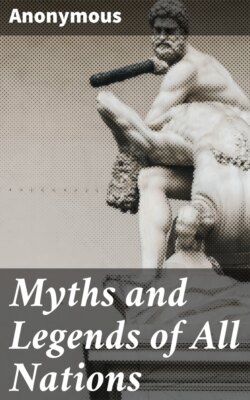Читать книгу Myths and Legends of All Nations - Anonymous - Страница 20
На сайте Литреса книга снята с продажи.
ОглавлениеDEUCALION AND PYRRHA CASTING THE BONES OF THEIR MOTHER BEHIND THEM
One high mountain in the country of Phocis still raised two peaks above the surrounding waters. It was the great Mount Parnassus. Toward this floated a boat containing Deucalion, the son of Prometheus, and his wife Pyrrha. No man, no woman, had ever been found who surpassed these in righteousness and piety. When, therefore, Jupiter, looking down from heaven upon the earth, saw that only a single pair of mortals remained of the many thousand times a thousand, both blameless, both devoted servants of the gods, he sent forth the North Wind, recalled the clouds, and once again separated the earth from the heavens and the heavens from the earth.
Even Neptune, lord of the sea, laid down his trident and calmed the flood. The ocean resumed its banks; the rivers returned to their beds; forests stretched their slime-covered tree-tops out of the deep; hills followed; finally stretches of level land appeared and the earth was as before.
Deucalion looked around him. The country was laid waste; it was wrapped in the silence of the grave. Tears rolled down his cheeks and he said to his wife, Pyrrha, "Beloved, solitary companion of my life, as far as I can see through all the surrounding country, I can discover no living creature. We two must people the earth; all the rest have been drowned by the flood. But even we are not yet certain of our lives. Every cloud that I see strikes terror to my soul. And even if danger is past, what shall we do alone on the forsaken earth? Oh, that my father Prometheus had taught me the art of creating men and breathing life into them!"
Then the two began to weep. They threw themselves on their knees before the half-destroyed altar of the goddess Themis, and began to pray, saying, "Tell us, O goddess, by what means we can replace the race that has disappeared? Oh, help the earth to new life."
"Leave my altar," sounded the voice of the goddess. "Uncover your heads, ungird your garments and cast the bones of your mother behind you."
For a long time Deucalion and Pyrrha wondered over the puzzling words of the goddess. Pyrrha was the first to break the silence. "Pardon me, O noble goddess," she said, "if I do not obey you and cannot consent to scatter the bones of my mother."
Then Deucalion had a happy thought. He comforted his wife. "Either my reason deceives me," he said, "or the command of the goddess is good and involves no impiety. The great mother of all of us is the Earth; her bones are the stones, and these, Pyrrha, we will cast behind us!"
Both mistrusted this interpretation of the words, but what harm would it do to try? Thereupon they uncovered their heads, ungirded their garments and began casting stones behind them.
Then a wonderful thing happened. The stone began to lose its hardness, became malleable, grew and took form—not definite at once, but rude figures such as an artist first hews out of the rough marble. Whatever was moist or earthy in the stones was changed into flesh; the harder parts became bones; the veins in the rock remained as veins in the bodies. Thus, in a little while, with the aid of the gods, the stones which Deucalion threw assumed the form of men; those which Pyrrha threw, the form of women.
This homely origin the race of men does not deny; they are a hardy people, accustomed to work. Every moment of the day they remember from what sturdy stock they have sprung.
